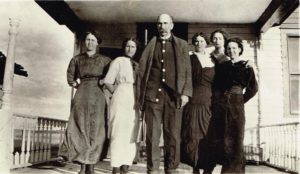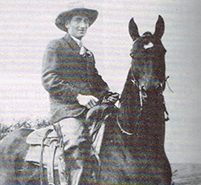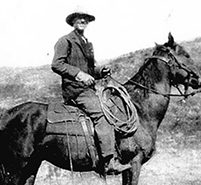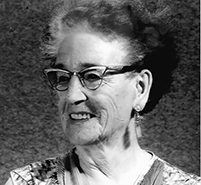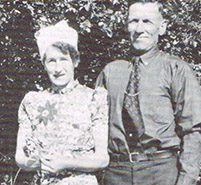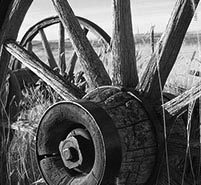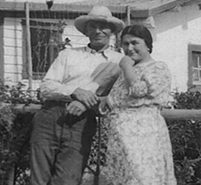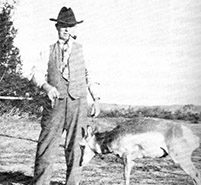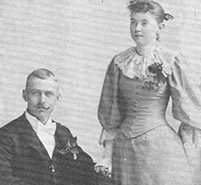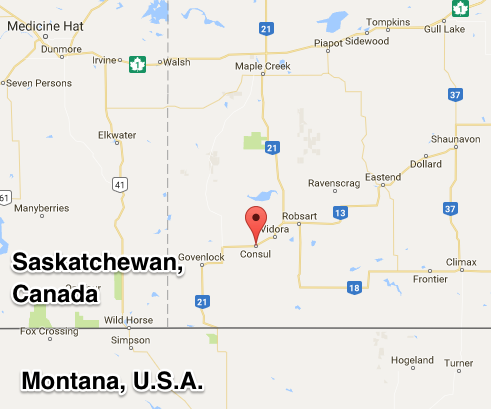J.A. (Dad) Gaff (1852-1941)
Source: Myra Gaff Ross & Eva Gaff in Merryflat and District history book, 1968
Mother and Dad were married in Kansas, USA. They lived there until Myra, Frances and Alla were born. Dad had been married before and had three children, Dennis (Bub), Carrie (Minor) and Etta (Boon), all born in Oronaque, Kansas.
After Dad married Myra Shafer their children were Frances (Paterson); Alla (McRae) who died in 1941; Jimmie who was kicked by horse when eight years old and died; Myra (Ross); Estys (Odegarde) who was referred to as Essie; Eva Gaff; Madge who died at age the age of five when her clothes caught on fire; and baby Edson who died at birth.
Dad did not like farming so went to Nebraska where he found a lovely place to raise cattle. Dad, Bub and Uncle Walter Shafer moved cattle, wagons and horses and built the house and barns. Then Dad came back to get the rest of the family.
Our uncle, John Gray (Dad’s half-brother), came up to see us. When he went back to Kansas he took our brother, Dennis (Bub), back with him to go to school. He lived with our Grandma Gray for quite a few years to go to school. When we kids got old enough to go to school Mother rented a house in a little town called Lake Side where Etta, Frances and I went to school. Our little brother, Jimmie, was a baby then. Later on we had a school closer to home that we went to.
In the large lakes there were big turtles that were grand to eat. We would get them out of the water and take them home and feed them on bread, corn and potatoes until they got good and fat. We had quite a lot of wild quail that were nice to eat, too.
Dad’s bunch of cattle grew too large for the land he owned. Cattle and horse stealing were getting very bad so Dad and Mother and Uncle Walter thought it was time for them to move to another place to ranch. Uncle Walter came to Canada to see what it was like; we heard gold grew on trees up in this north country. Dad thought, or was talked into it, by two of his friends that they were going down to Salt Lake City. While Dad was waiting to hear what Uncle had to say after looking the country over in Canada, Dad and Mother made up their minds. He should go and just see what Utah had for ranching as it was so much closer than coming to Canada with a bunch of little kids, as our Essie had been added to the Gaff family.
The break to leave Nebraska took place in 1895. Dad’s two friends who lived close to us, Tom Skoonover and Jack Armstrong, had heard there was good land around Salt Lake City. They sold their cattle, but took a bunch of horses with them. Dad took a bunch of horses and went with them to look over the country in Utah. He left the horses with these men and came back home. Dad did not like that country very well for stock. He got in touch with our uncle Walter who was spending his time in the Crowsnest Pass, Alberta. He told Dad and Mother it was a wonderful place for stock around Pincher Creek District. They made up their minds, they were moving to this district in Canada in the spring. They sold the cattle that fall, also the ranch. Just before Dad got back, sister Eva was born. Mother was very sick.
The spring of 1896 Dad sent Bub, who was just 18 years old, with a saddle horse, a pack horse, his bed and food for this trip to Salt Lake City to get the horses he had left with his two friends. Bub was to meet us in Wyoming at his uncle, Charlie Gettys’ place. This Gettys was Dad’s first wife’s brother. Bub never lost one horse on this long trip. We think we got to this Gettys Ranch just a few days before Bub arrived with the bunch of horses. This ranch was west of a wonderful landmark, the famous Devils Tower. It is a very high rock that stands out on flat country and can be seen from hundreds of miles away. This rock looks like a large box. It is just a solid wall straight up in the air. When we were there only one man had ever been to the top of this tower.
Just before we arrived at the Gettys Ranch we saw some small trees. There was one larger than the other trees; it stood about 50 feet in height. When we got up to it there was a short rope hanging tied to one of the branches. Also, a big box was lying on the ground close to this tree. Dad said he thought someone had been hung there. When we got to the Gettys Ranch they told us the story; a man was hung several months before we arrived.
From the Gettys Ranch we went on our way again, the same old ding-dong, up in the mornings early and drive all day until we found some good water where we would stay overnight and fill up the barrels on the sides of the covered wagons. Just to think of that long trip in covered wagons, how Mother did all that cooking and baking bread, washing on a washboard for us kids. We girls all wore dresses, not like the kids of today wearing slacks.
Mother washed clothes every night after supper and ironed them early in the morning. There were 11 of us to cook for and wash clothes. Etta, Myra and Frances helped with the dishes and chores and babysitting the four younger kids. When we hit a nice clean lake, creek or river we all had cold baths, otherwise it was a big tub with lots of nice warm water. Two kids would jump into it together. The men would have their baths in some lake, creek or river. We would, too, if it was a nice warm day.
When they started out from Nebraska there were seven kids, from 15-year-old Etta to Eva, six months old.
When we were going through Montana, Dad saw what he thought were wild turkeys and he shot some of them. When Mother cooked them and put them on the table Dad started to eat it and asked Mother why she had put so much sage on the meat. Mother said she did not put any sage on them. We found out from some folk that they were not turkeys but sage hens. We had a lot of nice fresh antelope and deer to eat on this trip. When we got to towns, for a change Mother and Dad would buy beef and chicken. Sometimes they bought chickens from people that were moving along with covered wagons. We bought milk, too.
When we got to Miles City, Montana, we had different experiences, thrills, and for we younger ones, bad chills. There were a lot of Indians in this town as there was a sort of picnic going on. Some were doing their dances. This part was our thrill. Bub and John Boon played ball and their team won the game. They also ran their horses in the races for the two days they were there. They won all the first and second prizes.
Now come the chills. The next evening just after supper, up rode about eight to ten Indians all painted up from head to their toes. None of them had any shirts on and about six did not have any pants on, just a small buckskin apron. There were two pretty young squaws with them, also a half breed Indian who did the talking for them. We kids were in our tent peeking out under it at what was going on out there. This is what the old buck came for – he wanted Dad to get wives for Bub and John (trade these two pretty squaws), trade them for Dad’s horses or money. Dad said that he did not want any more squaws, that he had six little ones and one big squaw. Then Dad asked the old buck if he would trade his Indian boys off for horses.
He said, “No, no they have to work and hunt for me.”
Dad said, “Will you buy some of my white squaws?”
He said, “Little squaws no good for me.” Our little Jimmy was playing outside the tent and went up by Dad.
The old buck saw him and said, “I give you one horse for young white buck.”
Dad said it was not enough horses.
He said, “Horse and colt, him just small buck, no work for long time.”
Dad said, “You say squaws no good but you want me to give you ten horses for your squaws. I do not want any more squaws.”
Dad was just having fun, but we kids did not know that. We got frightened, jumped up and grabbed Jimmy and ran to one of the covered wagons where Mother was putting Essie and Eva to bed. We hid Jimmy in a big box until those awful looking bucks left our camp. These Indians had fancy work to sell. Dad bought some of it for Mother.
The next morning we were to take the big ferry to cross the Yellowstone River. Something had gone wrong with the big ferry; the man that ran it said he was just using a small ferry until the large one was fixed. The biggest load he would take would be a wagon with four horses at one time. This is what the ferryman and Dad planned out. Take two trips for the wagons and two extra saddle horses to be ready to round up the horses after they swam the river. Then come back for the rest of the horses. They put the mares and colts on the ferry, tied some of the quiet horses to the ferry so they could swim with the help of the boat. Then let the loose horses swim behind the tied horses. Happy to say we never lost a horse.
I really think Dad was happier than any of us; he never went through this before in his life. He not only saved time on our trip, but saved money on ferry bills. He gave the ferry man a bottle of good brandy and told him if he ever got sick he would have good medicine to take. He also gave him a gift of a $20 gold piece. Dad and Mother used to write to this man after we came to Canada as he wanted to know what the country was like up here. I just am not sure, but I think his name was A.J. Johnson. We were on maybe two more ferries on that trip, but this one was so outstanding Dad used to tell about it after we came up to Canada.
We made camp after gathering the horses which swam the river. Three cowboys rode in that evening and had supper. They were moving a large herd of beef to market and were going to swim them across the river next morning. We all went to watch and it was a wonderful sight to see. There were seven hundred to eight hundred large five- and six-year-old beef with long horns. Next day we headed for Chinook, our last town stop before getting to Canada where nuggets grew on trees.
Frances Gaff says –
“About half way to Canada we saw our first rocks. We carried them in the wagon for days, but not for long as we later saw plenty of rocks.
When we first came to Canada there was not a fence line between Havre, Montana and the NWMP Detachment on Battle Creek where we first landed. The grass on the prairie was a foot high, all the sloughs were filled with water and mosquitoes were bad. The horses would come for miles to stand in the smudges, especially in the evenings.”
Dad repeated his old lessons to us. One went something like this – save every penny, nickel and dime, make a soft nest and drop them in. To your surprise they will hatch out a batch of money called dollars. There is a lot of truth to it! Other important lessons were riding and shooting. Etta was a very good rider and could drive a four-horse team as well as any man. She was also an excellent shot.
Mother’s lessons were different than Dad’s. They started out A, B, C, Cat, Rat, and 1,2,3; also how to sew, cook, knit, etc. At Chinook, Dad and Mother bought a large supply of groceries for the long trip to the Ten Mile Mounted Police Barracks at Battle Creek. We youngsters by now were disappointed that no nuggets grew on the trees, but Dad and Mother thought it was a great country with wood, water and lots of grass for the stock.
When we got here the only people near were Wood and Anderson and J.A. Ross. The NWMP were at the Ten Mile Detachment. Some of the police members there when we arrived were Sergeant McMinnie, Constable Purvis; Herb Nickel, and Louie Cobelle; Hugh Thomas was their cook. He had a pet antelope. It sure made itself at home. If the door was open it would dash in and help itself to Hugh’s bread, pie and cakes. If it could find any milk it would drink it all up. Hughie would get the broom and out would come the antelope, forty miles an hour, and Hughie after it, cussing his great pet, telling it he would kill it if it came in the house again. If Hughie did not latch the door it knew how to get the door open.
After we left the Ten Mile Barracks we had to go to Maple Creek to get all of Dad’s papers fixed up so we could live in Canada. Then we came back to this place up north on Battle Creek not far from the Lindner Ranch. Dad never made a log building in his life so he paid Louie Cobelle to come and help build the house, also to teach Dad, Bub and John (Boon) just how to cut the corners for building these log buildings.
Dad bought a large bunch of cattle. He put the calves and bulls and old cows in sheds close to the house in the winter to feed them lots of hay. The strong stock were left out and had the brush and trees for shelter, but he, Bub, Uncle Walter, John and Leonard would haul hay out to them in the mornings. One morning Dad and Uncle John took a load of hay out to these cattle in the trees; Dad was forking the hay off while Uncle went in the trees about 75 or more feet from the wagon. Dad looked up from pitching hay and saw a large wildcat just going to spring on top of Uncle. Dad grabbed the gun and shot the wildcat dead. It fell and knocked Uncle down. He jumped up yelling, “Jim, you have shot me! What you shot me for? I’m going to die.” Then Uncle saw the wildcat and he started to run for the wagon. Dad said, “I guess I did not hurt you very bad when you made that fast run here in two seconds.” The men always had a gun with them, ready to kill these wildcats for their pelts; these cats would kill young stock.
About a week later Bub, Leonard and Dad took a load of hay out to the stock in the same place. While the boys were unloading the hay, Dad had been spreading it around on the ground with a fork so all the stock could get it. Then he thought he would walk down to the creek to see if the water hole was frozen over. There was a small bank on the side of the creek with some bushes on it. To his surprise, and the wildcat’s surprise, they just about bumped into each other! Dad said they were not more than eight feet from each other. It just crouched down to spring at Dad, so Dad yelled for help, but got in the first blow with the pitchfork. By the time the boys got there with the gun the battle was over. The wildcat was dead and Dad was the hero in the battle.
Not long after settling on Battle Creek they started an irrigation project with teams and scrapers. This was in 1887 and 1888 and they built four miles of irrigation ditch and numerous dikes. Today we are still using the same works with Number 1 water rights on Battle Creek. This was registered in Edmonton in 1888 as this was the Territory of Assiniboia at the time.
In 1900 Uncle and Aunt (Gray) came to Canada to live. They visited the Gaff family for about two weeks on their way to Coronation, Alberta. They have left children to carry on the Gray name.
We are all very proud of our sister, Essie (Gaff) Odegard. She was the prettiest Gaff girl. Maple Creek put on a contest for the most gracious, young, beautiful girl in the district. Our Essie won first prize, a lovely piano. She married and went to the USA to live.
Dad, Alla and Eva lived on the JON Ranch for a few years, and then Dad bought the Govenlock Hotel from John Lindner. He and Alla lived there and Eva lived at the ranch. Alla married Andy McRae, and Dad stayed with them until 1941 when he passed on. Allie died of cancer the same year.
• Carrie Gaff Minor died in the flu epidemic of 1918.
• Myra Ross died in 1971 at the age of 85.
• Eva Gaff died in 1976 at the age of 81.
• Frances (Ma Pat) died in 1976 at the age of 89.
• Etta Boon died in 1980 at the age of 75.
• Honey Gaff died in 1980 at the age of 75.
• Estys Odegard died in 1982 at age of 87.

